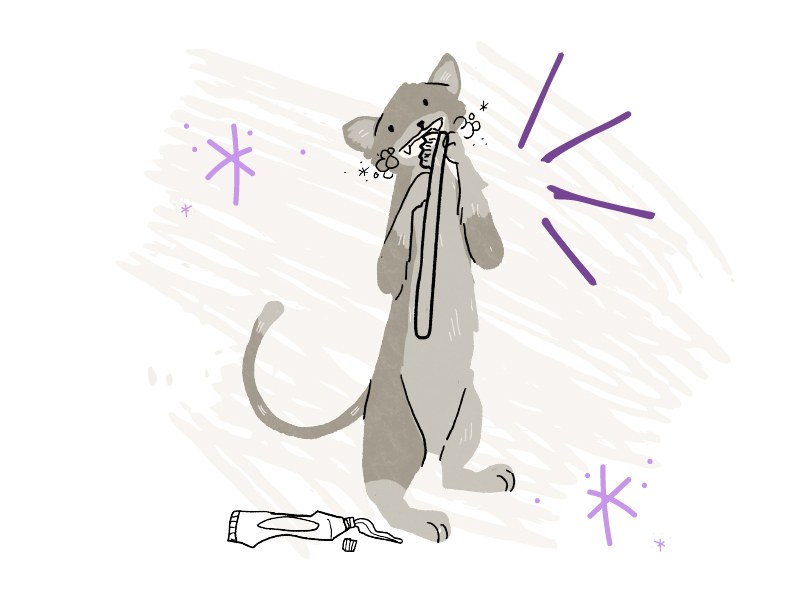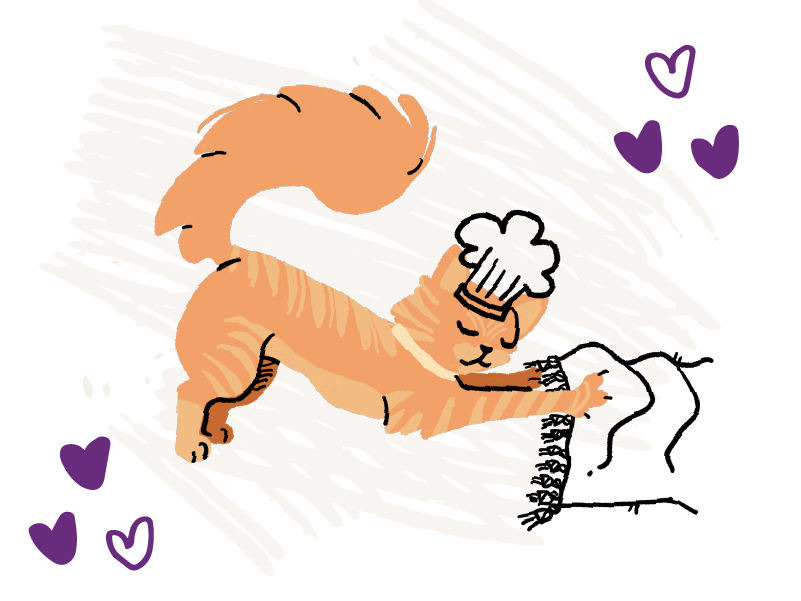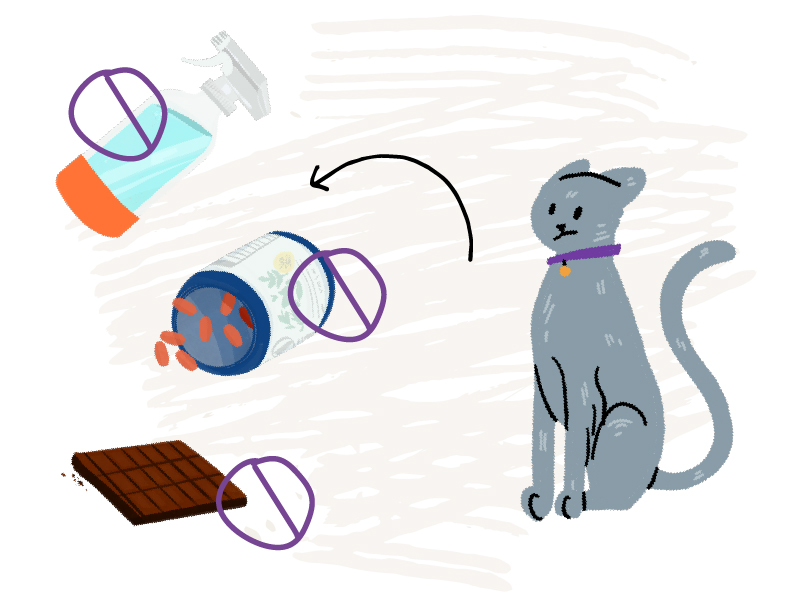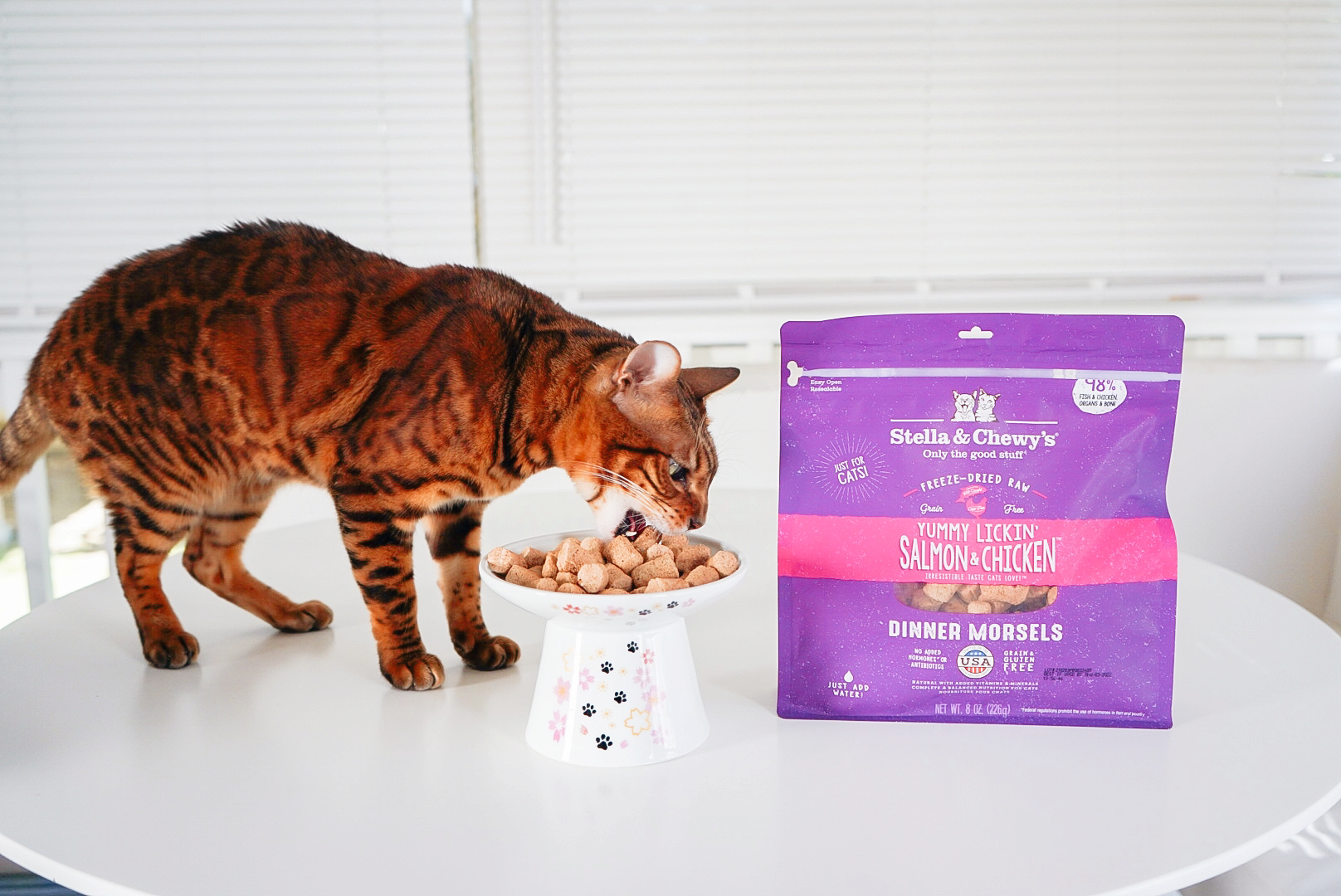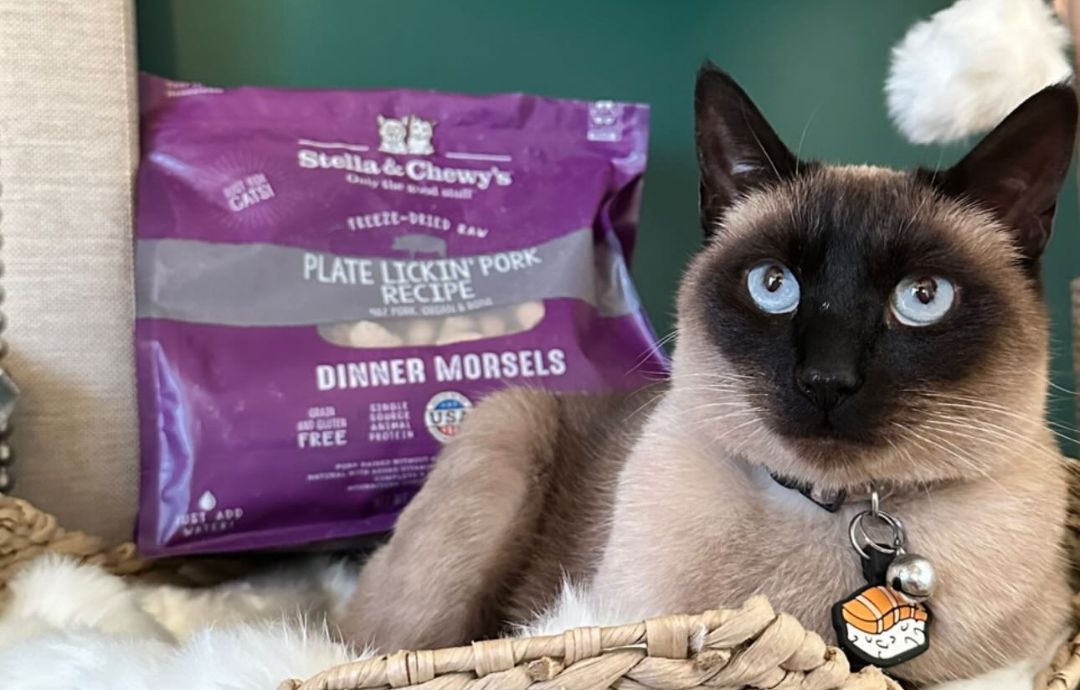
Because most cats are such picky eaters, we often think they know what’s best for them to eat. But some foods your cat might show interest in can pose serious risks to their health. Cats are curious and love to investigate food that’s left out on the counter or falls to the floor, so make sure to keep dangerous or toxic foods out of reach, and do your research before sharing if your cat begs for a taste of what you’re eating. If your cat does ingest any poisonous foods, or if you’re unsure, contact a veterinarian or the Pet Poison Helpline.
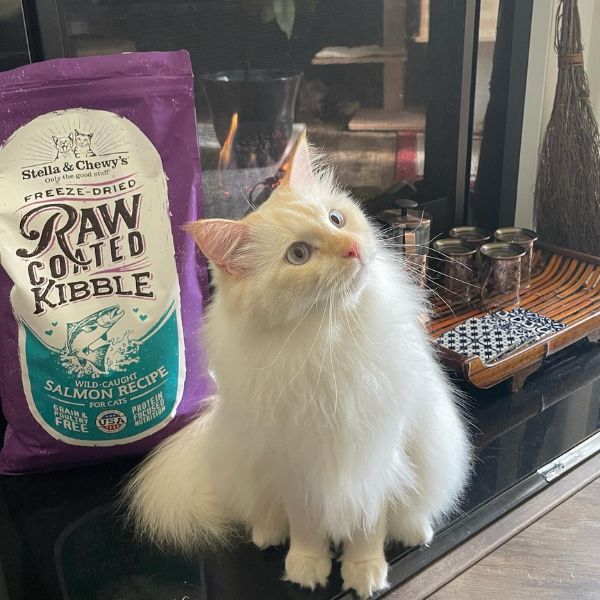
Dangerous Foods for Cats to Eat
The human foods listed below are poisonous to cats and should be kept away from them at all times:
Chocolate
You may already know that chocolate can be fatal to dogs, and the same is true for cats. Luckily, most cats won’t eat chocolate on their own. The most dangerous types are dark chocolate and baking chocolate. If your cat eats chocolate, it could cause abnormal heart rhythm, tremors, seizures, or death.
Alcohol
Even a very small amount of alcohol is poisonous to cats. Alcohol can cause vomiting, diarrhea, tremors, disorientation, trouble breathing, coma, and even death. This includes alcoholic beverages as well as isopropyl alcohol (rubbing alcohol).
Onions & Garlic
Anything in the onion and garlic family—including shallots, leeks, scallions and chives–is toxic to cats, especially in concentrated forms such as powders or mixes. Ingestion can cause damage to your cat’s red blood cells and lead to anemia.
Caffeine
Caffeine in large quantities can be fatal for your cat, such as the amount found in coffee grounds, tea bags and caffeine pills. Symptoms of caffeine poisoning include restlessness, rapid breathing, heart palpitations, and muscle tremors.
Raw Dough
The yeast contained in even a small amount of raw dough, such as bread or pizza dough, can cause expansion in your cat’s stomach, stretching the abdomen and causing severe pain that could possibly require surgery.
Grapes/Raisins
Even a small amount of grapes or raisins could cause your cat to become ill or lead to kidney failure. Currently, the toxic substance within grapes and raisins is unknown, so it is best to avoid allowing your cats to eat them.
Macadamia Nuts & Walnuts
Macadamias and walnuts are both toxic to cats, whether raw or roasted, and this includes macadamia and walnut oil. If your cat eats these types of nuts they could experience lethargy, vomiting, shaking and overheating. Nuts also present a choking hazard for cats, and the high levels of fat can cause vomiting or diarrhea, so it’s best to keep all tree nuts away from your kitty.
Avocados
Avocados are toxic to cats because of a substance called persin, which is mainly present in the skin, stem and pit. Persin can be toxic to cats in large quantities, causing vomiting, diarrhea, difficulty swallowing, and fever. The high levels of fat in avocados can also wreak havoc on your cat’s digestive tract or possibly trigger an allergic reaction.
Salty Snacks
Just like people, cats need salt, and quality cat food already has the appropriate amount of salt for them. Even one extra teaspoon of salt can be dangerous for cats, so keep them away from pretzels, chips, popcorn, cured meats and all other salty foods.
Many different herbs, including mint, lavender, oregano, tarragon, lemongrass, chamomile, St. John’s Wort and marjoram, are toxic to cats. Don’t let your cat steal a bite if you cook with herbs, drink herbal teas or use herbal supplements—and dispose of your tea bag as soon as you’re done steeping.
Cannabis is another herb which is toxic to cats, even in small amounts. Secondhand smoke from cannabis can be dangerous for cats as well, so never smoke around your cat. If you use cannabis, keep all forms of it (dried herb, tincture, candies, oils, etc) where your cat can’t get it.
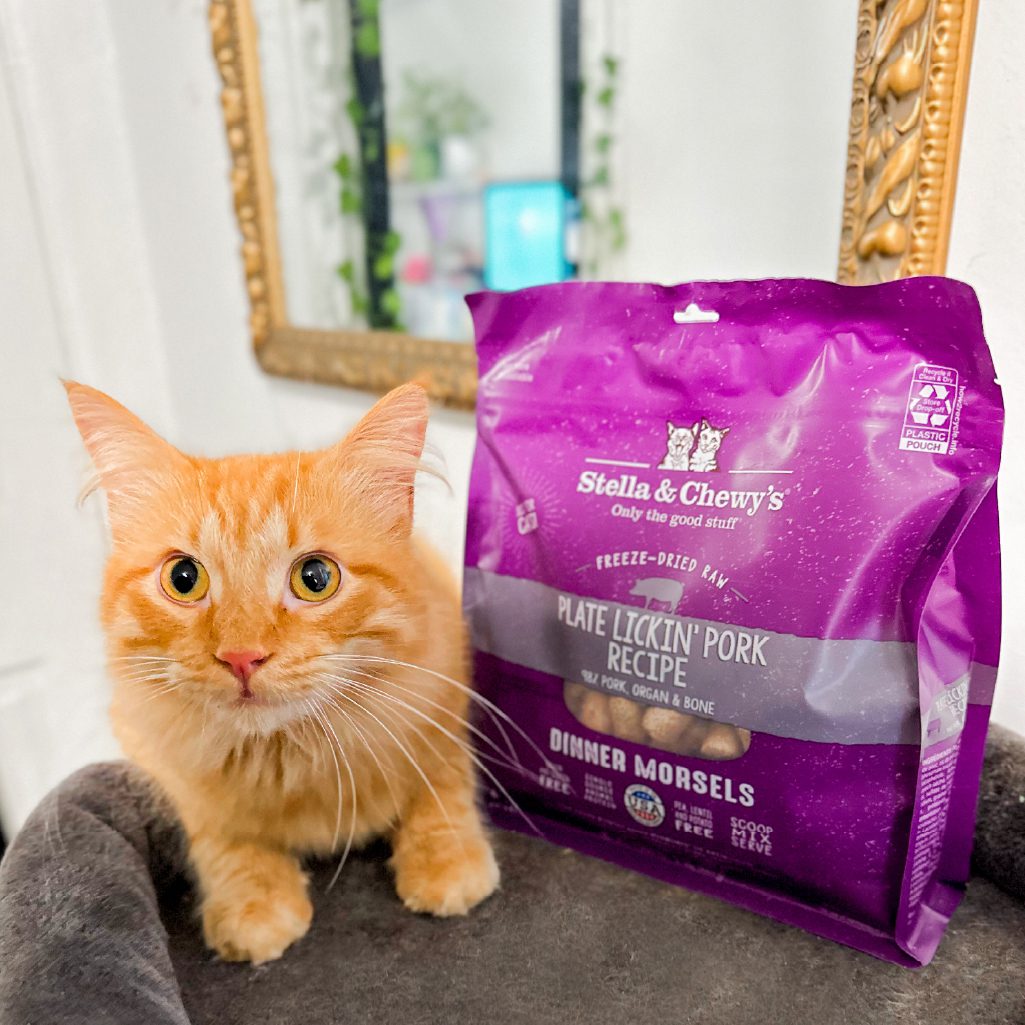
Foods That Aren’t Good for Your Cat
While not technically poisonous, the following foods can be problematic for cats—proceed with caution:
Milk & Dairy Products
Some cats may enjoy drinking milk or nibbling some cheese, but it’s not necessarily good for them. Most cats have trouble digesting the lactose in milk, which can cause an upset stomach or diarrhea.
Dog Food
While dog food is not toxic to cats, your cat has different nutritional needs than your dog. For example, cats need more protein and certain vitamins and fatty acids that dogs do not. Feeding only dog food to your cat could lead to malnutrition.
Peanuts
Peanuts aren’t toxic to cats, but cats can have a peanut allergy just like people can! And like tree nuts, peanuts present a choking risk to cats and are high in fat, which could upset their digestion. Some peanuts are dusted with salt or other seasonings (like garlic) which would make them toxic to cats.
Citrus Fruits
Large quantities of citrus can be toxic or even fatal to cats, but it’s very rare. More common is skin irritation if your cat touches citrus fruit skin, leaves, stems. And eating a small amount of citrus fruit can give your cat an upset stomach. Luckily, cats have a natural aversion to citrus! But should probably avoid using citrus essential oils in your diffuser if you have a cat, because the airborne droplets could collect on their fur.
Coconut
Coconut flesh, coconut milk and coconut water are all bad for cats because they’re high in potassium (while coconut flesh and milk are high in fat). It’s better to steer clear of coconut to avoid giving your cat an upset stomach or electrolyte imbalance.
Canned Tuna
Canned tuna for people isn’t made for cats, and it might contain dangerous levels of sodium. Tuna packed in oil contains high levels of fat, which can cause vomiting and diarrhea in cats. If your cat loves tuna, you’re better off giving them nutritionally balanced cat food with tuna.
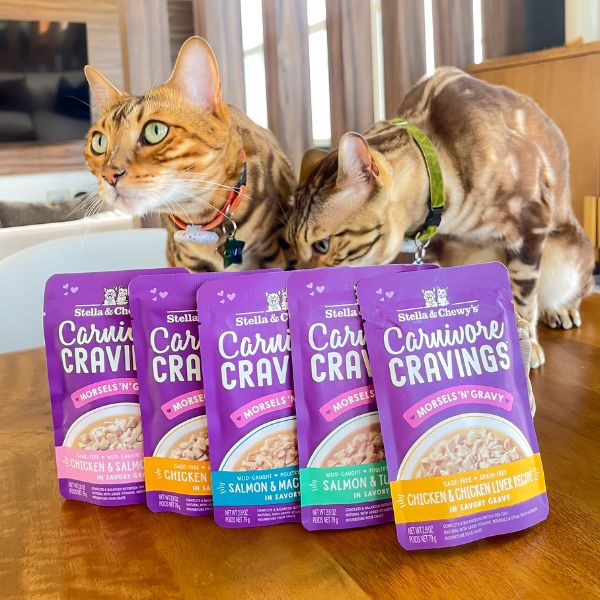
What About Raw Meat & Fish?
If you’re buying and feeding your cat raw meat or fish straight from the store or butcher (not a raw diet specifically formulated for cats), there may be potential risks. But it is possible to safely feed your cat a raw diet. Purchasing pre-made raw cat food is not only convenient for you, it means your cat is getting complete and balanced nutrition.
How to Prevent Your Cat From Eating Toxic Foods
Even though many types of human foods pose a danger for cats, there are simple ways to keep your cat from eating them:
- Store toxic foods out of reach – keep them in a drawer or cabinet your cat can’t get to, or install cat-proof locks.
- Make sure your garbage can has a lid your cat can’t open, or keep your trash can in a cat-proof cabinet.
- Keep your cat off of the kitchen counter when you’re preparing food that’s dangerous for them
- Print out a list of foods that are toxic to cats and keep it in your kitchen. Make sure other members of your household know what not to feed the cat.
- Discourage your cat from begging and don’t get in the habit of giving them people food.
There are also several household items that are toxic to cats which should be similarly avoided.
Signs Your Cat Ate Something Toxic
Different dangerous foods can cause varying symptoms if your cat eats them, but in general these are the most common signs:
- Diarrhea & vomiting
- Excess drooling
- Difficulty breathing or swallowing
- Weakness/lethargy
- Rapid or irregular heartbeat
- Unsteady walking, or collapse
- Swollen or inflamed skin
- Lack of appetite
- Overconsumption of water
- Jerking or twitching (signs of seizure)
- Loss of bladder or bowel control
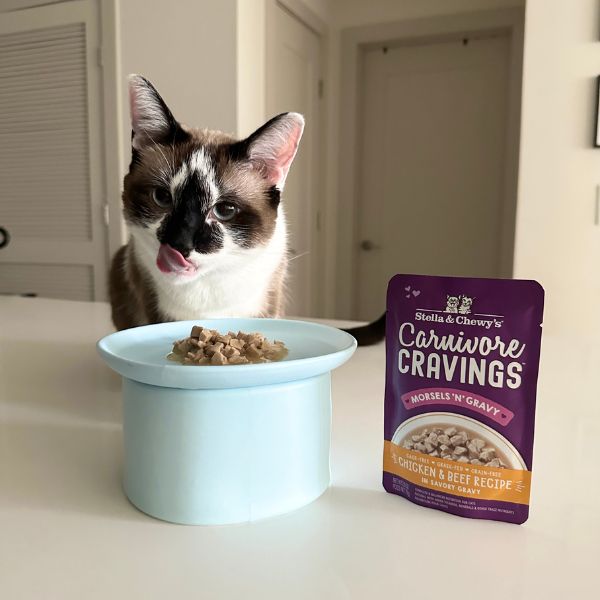
What to Do If Your Cat Ate a Dangerous Food
If you see or suspect that your cat ate something poisonous, call the ASPCA poison control number or your veterinarian right away (don’t wait to see if your cat develops symptoms) so they can advise you on your next steps.
If you need to bring your cat to the vet or an emergency animal hospital, bring the food item or label with you to help them diagnose your cat. If you’re not sure what they might have eaten, do a quick sweep for clues.
Treatment will vary depending on the poisonous food your cat ate, and the amount.
Feed Your Cat a Diet That Helps Them Thrive
Don’t hesitate to ask your cat’s veterinarian questions about food and feeding, especially if you’re thinking about changing your cat’s diet.
If your cat is a picky eater, rather than tempting them with human foods there are safer ways you can entice a picky cat to eat!
GET $3 OFF, INSIDER OFFERS, AND HELPFUL PET CARE TIPS.
By entering your information, you are opting in to receive communication from Stella & Chewy's


